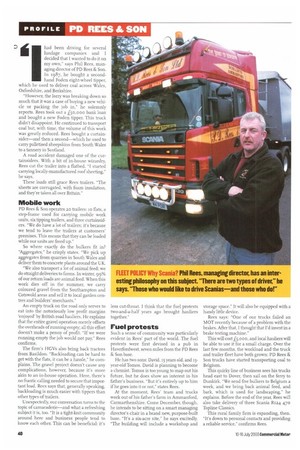had been driving for several haulage companies and decided that
Page 40

If you've noticed an error in this article please click here to report it so we can fix it.
I wanted to do it on my own," says Phil Rees, managing director of PD Rees & Son. In 1987, he bought a secondhand Foden eight-wheel tipper, which he used to deliver coal across Wales, Oxfordshire, and Berkshire.
"However, the lorry was breaking down so much that it was a case of buying a new vehicle or packing the job in," he solemnly reports. Rees took out a 150,000 bank loan and bought a new Foden tipper. This truck didn't disappoint. He continued to transport coal but, with time, the volume of this work was greatly reduced. Rees bought a curtainsider—and then a second—which he used to carry palletised sheepskins from South Wales to a tannery in Scotland.
A road accident damaged one of the curtainsiders. With a bit of in-house wizardry, Rees cut the trailer into a flatbed. "I started carrying locally-manufactured roof sheeting," he says.
These loads still grace Rees trailers. The sheets are corrugated, with foam insulation, and they're taken all over Britain."
Mobile work
PD Rees & Son operates zo trailers: ro flats, a step-frame used for carrying mobile work units, six tipping trailers, and three curtainsiders. "We do have a lot of trailers; it's because we tend to leave the trailers at customers' premises. This means that they can be loaded while our units are freed up."
So where exactly do the bulkers fit in? "Aggregates," he crisply states. "We pick up aggregates from quarries in South Wales and deliver them to concrete plants around the UK.
"We also transport a lot of animal feed; we do straight deliveries to farms. In winter, 99% of our return loads are animal feed. When this work dies off in the summer, we cam coloured gravel from the Southampton and Cotswold areas and sell it to local garden centres and builders' merchants."
An empty truck on the road only serves to eat into the notoriously low profit margins 'enjoyed' by British road hauliers. He explains that the entire gravel operation merely offsets the overheads of running empty; all this effort doesn't make a penny of profit. "If we were running empty the job would not pay," Rees confirms.
The firm's HGVs also bring back tractors from Basildon. "Backloading can be hard to get with the flats, it can be a hassle," he cornplains. The gravel project doesn't cause any complications, however, because it's more akin to an in-house operation. Here, there's no frantic calling needed to secure that important load. Rees says that, generally speaking, backloading is much easier with tippers than other types of trailers.
Unexpectedly, our conversation turns to the topic of camaraderie—and what a refreshing subject it is, too. "It is a tight-knit community around here and business people tend to know each other. This can be beneficial: it's less cut-throat. I think that the fuel protests two-and-a-half years ago brought hauliers together."
Fuel protests
Such a sense ot community was particularly evident in Rees' part of the world. The fuel protests were first devised in a pub in Haverfordwest, seven miles from the PD Rees & Son base.
He has two sons: David, 15 years old, and 13year-old Tomos. David is planning to become a chemist. Tomos is too young to map out his future, but he does show an interest in his father's business. "But it's entirely up to him if he goes into it or not," states Rees.
At the moment, Rees' team and trucks work out of his father's farm in Ammanford, Carmarthenshire. Come December, though, he intends to be sitting on a smart managing director's chair in a brand new, purpose-built base. "It's a six-acre site," he says excitedly. "The building will include a workshop and
storage space." It will also be equipped with a handy little device.
Rees says: "One of our trucks failed an MOT recently because of a problem with the brakes. After that, I thought that I'd invest in a brake testing machine."
This will cost L5,000, and local hauliers will be able to use it for a small charge. Over the last few months, the workload and the truck and trailer fleet have both grown: PD Rees & Son trucks have started transporting coal to Belgium.
This quirky line of business sees his trucks head east to Dover, then sail on the ferry to Dunkirk. "We send five bulkers to Belgium a week, and we bring back animal feed, and bark, which is used for landscaping," he explains. Before the end of the year, Rees will also take delivery of three Scania R124 470 Topline Classics.
This rural family firm is expanding, then. "It's down to personal contacts and providing a reliable service," confirms Rees,




































































































































































